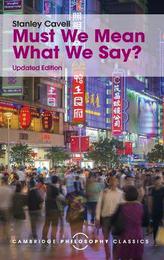
|
Must We Mean What We Say?: A Book of Essays
Hardback
Main Details
| Title |
Must We Mean What We Say?: A Book of Essays
|
| Authors and Contributors |
By (author) Stanley Cavell
|
| Series | Cambridge Philosophy Classics |
|---|
| Physical Properties |
| Format:Hardback | | Pages:368 | | Dimensions(mm): Height 235,Width 156 |
|
| Category/Genre | Western philosophy from c 1900 to now
Ethics and moral philosophy |
|---|
| ISBN/Barcode |
9781107113633
|
| Classifications | Dewey:191 |
|---|
| Audience | | Undergraduate | | Postgraduate, Research & Scholarly | |
|---|
| Edition |
2nd Revised edition
|
|
Publishing Details |
| Publisher |
Cambridge University Press
|
| Imprint |
Cambridge University Press
|
| Publication Date |
22 October 2015 |
| Publication Country |
United Kingdom
|
Description
In this classic collection of wide-ranging and interdisciplinary essays, Stanley Cavell explores a remarkably broad range of philosophical issues from politics and ethics to the arts and philosophy. The essays explore issues as diverse as the opposing approaches of 'analytic' and 'Continental' philosophy, modernism, Wittgenstein, abstract expressionism and Schoenberg, Shakespeare on human needs, the difficulties of authorship, Kierkegaard and post-Enlightenment religion. Presented in a fresh twenty-first century series livery, and including a specially commissioned preface, written by Stephen Mulhall, illuminating its continuing importance and relevance to philosophical enquiry, this influential work is now available for a new generation of readers.
Author Biography
Stanley Cavell is the Walter M. Cabot Professor of Aesthetics and the Theory of Value, Emeritus, at Harvard University. He has published widely on a range of subjects from the analytic philosophical tradition to Shakespeare.
Reviews"This book changed philosophy. When it was originally published it was both exhilirating and astonishing - for its daring disregard of disciplinary boundaries....No reader of Cavell should be surprised to observe that, now as then, new forms of reductionism, scientism, and sheer flight prove appealing to those for whom a complex human understanding is more than their hearts can bear." Martha Nussbaum, author of Upheavals of Thought "This book is still the best introduction to the wide-ranging thoughts and the powerful imagination of one of America's most distinguished men of letters. In it, Cavell weaves together Wittgenstein's reactions fo philosophical skepticism with Shakespeare's descriptions of human needs, and J.L. Austin's appeals to 'the ordinary' with reflections on how art lets us see familiar objects anew. No one since William James has been so successful at re-humanizing philosophy - at rescuing that academic discipline from hyperprofessional self-absorption." Richard Rorty, author of Contingency, Irony and Solidarity
|